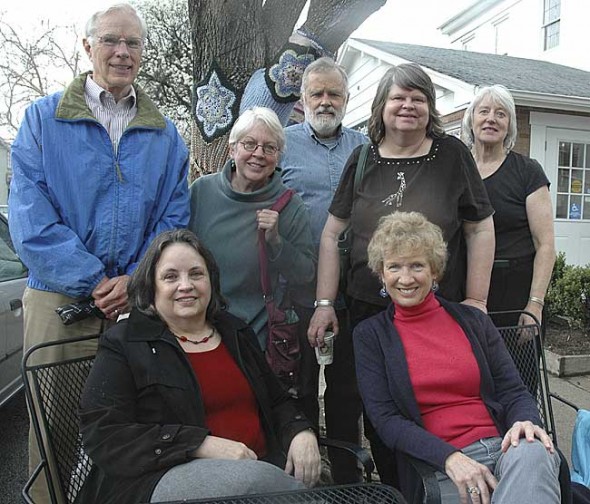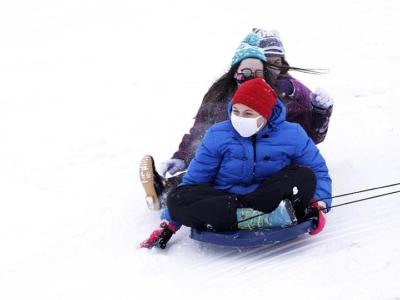
A local celebration of the Peace Corps, which is observing its 50th birthday, will take place in Yellow Springs this Sunday, April 17, from 1:30 to 4 p.m. at the Senior Center. Shown above are former Peace Corps volunteers, from left seated in front, Virginia Caudill and Priscilla Janney-Pace. In the back, from left, are Hap Cawood, Jeanne Lemkau, Hardy Ballantine, Kay Reimers and Suzanne Oldham. (Photo by Diane Chiddister)
A celebration of the Peace Corps—A life-changing experience
- Published: April 21, 2011
Yellow Springs is known as a singular place, but villagers may be unaware of one unique aspect of the village: its residents include an unexpectedly large percentage of returned Peace Corps volunteers.
“On a per capita basis, there’s a lot of volunteers who live there,” said George Brose of the Southwest Ohio Returned Volunteer Organization. On his mailing list of about 50 returned volunteers from the Dayton and Springfield area, 26 live in the village, he said, stating that Yellow Springs’ Peace Corps presence, if not the highest per capita nationwide, is one of the highest.
It’s not entirely clear how that Peace Corps influence has shaped Yellow Springs. Residents who were once volunteers traveled to a wide variety of countries for varied assignments, including teaching English in Nigeria, doing public health work in Nicaragua, working as an HIV administrator in Zimbabwe and advising farmers in Sierra Leone. But what is clear is that no matter what they did or where they served, former volunteers share a conviction that the experience changed their life.
“It permanently altered me, in ways that shaped me as an adult,” said Jeanne Lemkau, of her two-year stint in Nicaragua.
Local volunteers will gather this Sunday, April 17, from 1:30 to 4 p.m. at the Senior Center to celebrate and honor the organization, as part of the 50th anniversary of the founding of the Peace Corps. The event will include Thai food and a presentation by villager Helen Lapedes on her recent experience serving in Thailand. All are welcome to attend, and donations will be accepted at the event, which is sponsored by the Southwest Ohio Returned Volunteer Organization.
In recent interviews, several former volunteers identified traits they acquired during their Peace Corps experience that have served them well as adults. For instance, Kay Reimers has recently launched an ambitious project to raise funds to re-invigorate community theater in Yellow Springs. The tenacity required to stick with such a daunting project came from her Peace Corps experience on the Pacific island of Palau, Reimers said.
“In the Peace Corps, you take for granted that there will be obstacles with anything you do,” she said. “There’s no money, little institutional support — but you do it anyway.”
For Jeanne Lemkau, who worked on improving health care for Nicaragua’s rural poor, her Peace Corps years sparked a lifelong passion for public health issues. That interest was expressed most recently in January when Lemkau led a Witness for Peace service trip to Nicaragua, taking physicians and psychologists to small rural villages to offer free care.
Being in the Peace Corps also planted in Lemkau a lifelong sense of being “a citizen of the world,” who approaches American media reporting of international events with a critical and questioning attitude.
“You watch the news differently after you’re there,” she said.
Like many Peace Corps volunteers, Lemkau, who went to Nicaragua as a 21-year-old, came back to this country with a new sense of the wealth of American society, having worked in rural areas where people lived in straw huts with no water. Likewise, Harvey Paige, who with his wife, Ruth, went as volunteers to Sierra Leone in 1969, came home newly sensitive to American abundance. For Harvey, realizing he could live without American comforts has allowed him to travel widely and experience different cultures, including recent stints teaching in Abu Dhabi and Bahrain.
“I realized I didn’t need the infrastructure of American society to survive,” Paige said.
One of the earliest Peace Corps volunteers, Hardy Ballantine went to Nigeria in 1964, just three years after the founding of the organization. His experience there teaching English and history at a secondary boys school helped to solidify his interest in education, Ballantine said. But even more impactful, being in the Peace Corps helped catapult Ballentine out of what he perceived as the narrow expectations for young men at that time, especially working for a corporation in a 9-to-5 job.
“Getting into the Peace Corps changed all that. It busted that shell,” Ballantine said. “It allowed me to mentally move out of the mainstream into a more alternative lifestyle.”
He went on to graduate school at Columbia University, and after that he and his wife, Jeanne, became faculty members at a small black college in Alabama before moving to this area to teach at Wright State.
Those interviewed agreed that the Peace Corps was by no means easy, nor always a good experience. Rick Donahoe served as a settlement officer for the Kenyan government from 1966–69, helping to settle 400 farm families on a large area of previously white-owned land in the Nyanza Province, the home of the Luo, the tribe of President Obama’s father.
“Being there shortly after independence in post-colonial East Africa, it felt much of the time that my and the Peace Corp’s presence was salt in an open wound,” Donahoe wrote in an e-mail.
Several former volunteers, like Donahoe, found that their assigned job smacked of white paternalism, such as Harvey Paige’s job helping Nigerian farmers grow a new kind of rice that the farmers had no interest in, or Ruth Paige’s assignment to teach women a new way to feed their babies, when the old way was working just fine. But these volunteers simply circumvented their assignments to come up with something more useful, Paige said.
Being young, isolated and in a radically different culture posed a challenge to many Peace Corps volunteers, including Kay Reimers, who was the only Peace Corps volunteer in her village on the island of Palau, north of New Guinea. In retrospect, Reimers believes that it’s too much to ask young adults just out of college to navigate such a challenge, and if she could do it again, she’d go as a more mature adult.
Yet the challenge proved significant, in that she found in herself an unknown strength, Reimers said, and she credits the experience with helping her to become a writer.
While the specifics of the place and work differed, Peace Corps volunteers shared a powerful and life-altering experience at an impressionable age, Lemkau said. They were all launched from their comfortable lives into a radically different culture, most often one of hardship and poverty. And many, like Lemkau, found themselves permanently changed by living in a culture that emphasized generosity over individualism, cooperation over competition.
“I’ve never felt more at home in the United States than I did before I left for the Peace Corps,” Lemkau said. “And I’ve never felt completely at home here since I came back.”
For more information on this weekend’s event, contact George Brose at 605-2022.
The Yellow Springs News encourages respectful discussion of this article.
You must login to post a comment.
Don't have a login? Register for a free YSNews.com account.
Parkinsons.jpg)














No comments yet for this article.